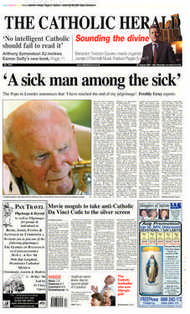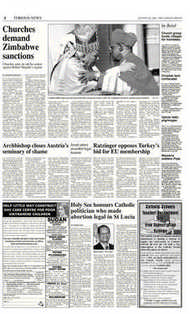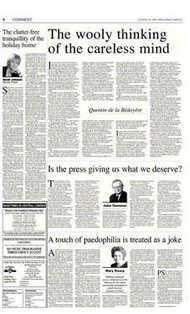Page 4, 20th August 2004
Page 4

Report an error
Noticed an error on this page?If you've noticed an error in this article please click here to report it.
Tags
Share
Related articles
News Analysis
South African Bishops Urge Pretoria To Combat Tyranny Of...
Cricket Chiefs Snub Zimbabwe Christians' Plea
Zimbabwe Move After Priest Warns
Africa
Churches demand Zimbabwe sanctions
Churches unite in call for action against Robert Mugabe’s regime
BY JOSEPHINE SIEDLECKA
IN AN UNPRECEDENTED move, church leaders of all denominations across Southern Africa have united in calls to the international community to impose tough sanctions on Zimbabwe.
On Friday, the South African Catholic Bishops’ Conference (SACBC) appealed to the South African government to impose targeted sanctions on Zimbabwe’s ruling elite.
Repeating this view, on Saturday the Southern African Council of Churches (SACC), which represents all major denominations, called on a range of organisations to condemn the Zimbabwean government’s human rights violations.
A spokesman for the SACBC said: “We believe the South African government knows the appropriate sanctions to take against Zimbabwe as happened during the apartheid era.” He added: “The sanctions should spare the already suffering people but would be directed at mostly those in power who have continued to benefit from the regime’s system.” Cardinal Wilfred Napier, president of the South Africa Bishops’ Conference hinted last month that there might be calls for “intelligentlyapplied” sanctions against the Mugabe regime.
Referring to the widespread famine in Zimbabwe, Cardinal Napier, South Africa’s first black cardinal, said: “What further suffering will sanctions bring to the people of Zimbabwe? Sanctions in South Africa brought a quicker end to oppression. But I think you have to do it intelligently.” On Saturday, SACC general secretary Molefe Tsele told the SA-based daily News Online: “The time has now come for the UN, the Southern African Development Community and the African Union to act against human rights violators hiding behind flimsy excuses.” He said the churches should send a clear message to human rights violators that they would be accountable for human rights abuses at some stage once they are ousted from power.
He said: “We have to be unapologetic in requiring the human rights of ordinary Zimbabweans to be upheld. Their rights are being sacrificed and we have to resolutely defend the rights of Zimbabweans who continue to suffer.” Although there have been many grassroots protests against President Mugabe’s government, up to now Archbishop Pius Ncube of Bulawayo has been virtually the only high-ranking representative of the churches in Zimbabwe to speak up for human rights in the country. Last month he came to England to appeal on behalf of his people and met Cardinal Cormac Murphy O’Connor, aid agencies and politicians as well as many of his exiled parishioners.
The archbishop warned that the situation in his country was becoming critical. He said President Mugabe was planning to starve the population of Zimbabwe into submission before next year’s elections, saying he thought 500,000 would have died already were it not for food aid.
Archbishop Ncube, who has always called for peaceful change, said he feared his country could erupt into riots, which would be brutally suppressed by the army.
He said: “It would be tragic if all of a sudden people went violent. Mugabe will call the army — he is a cruel man.” The archbishop said he was disappointed by South African President Thabo Mbeki, who refuses to criticise Mugabe and effectively props up the regime.
He urged that Britain should confront Mugabe’s tactic of setting up Prime Minister Tony Blair as a dangerous enemy and blaming Britain, or the West generally, for the country’s ills.
“Secretly, I think Mugabe admires the British,” the archbishop said. “His accent is quite unique among Africans. He had a good Catholic education. He knows full well what is right but he is too embarrassed, too proud to own up to the fact that he is causing suffering to his own people.” In the past Archbishop Ncube has been offered bribes of confiscated farmlands and buildings. He has refused all these. He has received death threats for his outspoken views.
Last Friday, speaking at the funeral of a Zanu-PF leader, Mugabe accused the archbishop of ‘behaving in a ‘satanic’ way by visiting England. He said: “They can never, ever be our friends. Indeed ... whatever they do, however they think, they remain our colonial enemies.” On Saturday, Bishop Robert Christopher Ndlovu of Hwange will be installed as the new Archbishop of Harare. He succeeds Archbishop Patrick Fani Chakaipa, who died last April, aged 71.
All Zimbabwean bishops and the Apostolic Nuncio are expected to attend.
blog comments powered by Disqus















